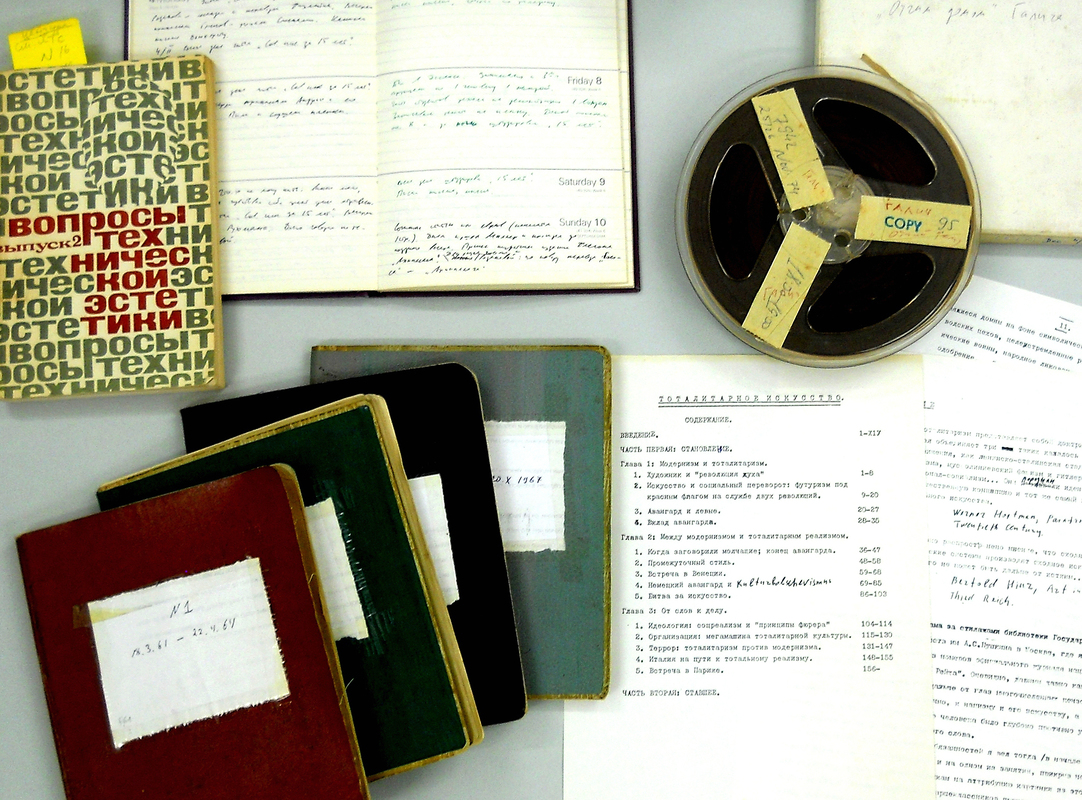Igor Golomshtok archive
Soviet and British art historian Igor Golomshtok (1929–2017) devoted the majority of his work to the history of world art. Golomshtok’s personal archive was donated to the Research Center for Eastern European Studies at Bremen University in 1996, with the latest materials received at the end of 2018.
The foundation features Golomshtok’s biographical and artistic records: his diaries (1961–1974); handwritten copies of articles and lectures that he read at the Art History department of Lomonosov Moscow State University in the mid-1960s, as well as in Oxford and St. Andrews in the mid- and late 1970s; manuscripts and layouts of his books (Hieronymus Bosch, Paul Cézanne, Contemporary Progressive Art in Capitalist Countries, Totalitarian Art, etc.).
The foundation also contains transcriptions of his public lectures and radio programs he hosted at Radio Svoboda and the BBC, along with materials documenting his work at Kontinent magazine.
A significant part of the archive is composed of Golomshtok’s personal and business correspondence with Soviet and Western artists, art historians, cultural theorists, historians, and representatives of dissident circles. His respondents include Gyuzel Amalrik, George Baley, Boris Birger, Yulia Vishnevskaya, Yuri Gastev, Martin Dewhurst, Robert Conquest, Vladimir Maksimov, Father Alexander Men, Alexander Piatigorsky, Andrei Sinyavsky, Igor Shelkovsky, among many others. Correspondence with Ilya Ehrenburg regarding Golomshtok’s book Picasso co-authored with Andrei Sinyavksy, as well as Ehrenburg and Mikhail Alpatov’s letters to the Znanie publishing house with a positive review of the book, are worth a special mention.
The archive also contains other valuable and noteworthy manuscripts and texts by various authors distributed via “samizdat” and/or published through “tamizdat” sources. Completing the foundation is the collection of books from Golomshtok’s library, featuring exhibition catalogues and art-historical periodicals.
About Igor Golomshtok
Igor Golomshtok (1929, Tver-2017, London) was an art historian, teacher, and radio show host. Graduate of the Moscow Financial Institute (1949), in 1948 he enrolled in the evening department of Art History of the Philological (later, Historical) Faculty of Lomonosov Moscow State University.
Golomshtok worked at the all-Soviet research workshops on restoration of architectural monuments, in the department of traveling exhibitions of the Direction of Art Exhibitions and Panoramas at USSR’s Ministry of Culture, at Pushkin State Museum of Fine Arts (1955–1963), before later becoming senior research associate at the All-Soviet Research Institute of Technical Aesthetics.
In 1960, Golomshtok released the book Picasso-the first monograph about the artist published in the Soviet Union, co-authored with Andrei Sinyavsky.
In 1966, he was summoned as a witness in the trial of Andrei Sinyavsky and Yuli Daniel and was sentenced to six months of corrective labor after refusing to testify.
Golomshtok was persecuted for his involvement in the petition campaign launched around the Trial of the Four (1968): with a ban put on his publications, publishing houses terminated contracts with him, while copies of Golomshtok’s book and compilation of articles were destroyed. In 1972 he migrated to London. Golomshtok lectured at St. Andrews, Essex, and Oxford universities. He collaborated with Radio Svoboda and worked at the BBC Russian Service from 1979 to 1989. In 1974–1975 he was executive secretary at Kontinent magazine.
Author of several books, Golomshtok’s most famous work is Totalitarian Art where he provides an analysis of common traits and differences between the art of the Soviet Union, the People’s Republic of China, the Third Reich, and Fascist Italy. Co-authored with Alexander Glezer, in 1977 he released the book Unofficial Art from the Soviet Union about Soviet nonconformist artists.
The materials of the foundation were processed in 2016, with the latest acquisitions received in 2018 still being processed.
- Collections
- Persons
- Keywords
- Type of entry
- Place
- Time span
